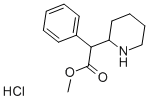<SC>L</SC>-3,4-Dihydroxyphenylalanine methyl ester hydrochloride , ≥98% , 1421-65-4
Synonym(s):
Methyl L -DOPA hydrochloride
| Pack Size | Price | Stock | Quantity |
| 250MG | RMB36.00 | In Stock |
|
| 1G | RMB80.00 | In Stock |
|
| 5G | RMB221.60 | In Stock |
|
| others | Enquire |
PRODUCT Properties
| Melting point: | 174-175℃ |
| alpha | +9.0° to +11.0° (20°C, 589nm) (C=2 in methanol) |
| storage temp. | -20°C |
| solubility | DMSO (Slightly), Methanol (Slightly) |
| form | solid |
| color | white |
| InChI | InChI=1/C10H13NO4.ClH/c1-15-10(14)7(11)4-6-2-3-8(12)9(13)5-6;/h2-3,5,7,12-13H,4,11H2,1H3;1H/t7-;/s3 |
| InChIKey | WFGNJLMSYIJWII-WMASNCOMNA-N |
| SMILES | C1(=CC=C(O)C(O)=C1)C[C@H](N)C(=O)OC.Cl |&1:9,r| |
Description and Uses
L-DOPA (Item No. 13248) is a metabolic precursor of dopamine that is capable of crossing the blood brain barrier to act as a dopamine D1 receptor agonist. It is produced from L-tyrosine by trysosine hydroxylase. In the brain, L-DOPA is converted to dopamine by the enzyme aromatic L-amino acid decarboxylase. It is conventionally used to increase dopamine concentrations in the brain as a treatment for Parkinson’s disease and stroke recovery. L-DOPA methyl ester is a neutral derivative of L-DOPA formulated for increased solubility compared to the parent compound.
L-3,4-Dihydroxyphenylalanine methyl ester hydrochloride has been used:
- in treating 6-hydroxydopamine induced lesions mice serotonin neurons
- in tyrosinase activity in B16F10 skin melanoma cells
- to test its neuroprotective effect in mesencephalic neurons
Safety
| Symbol(GHS) |  GHS07 |
| Signal word | Warning |
| Hazard statements | H319-H335-H315-H302 |
| Precautionary statements | P264-P280-P305+P351+P338-P337+P313P-P264-P270-P301+P312-P330-P501-P264-P280-P302+P352-P321-P332+P313-P362 |
| WGK Germany | 3 |


